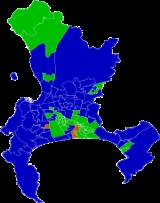
Cape Town City Council
Encyclopedia
The City Council is the legislative body of the City of Cape Town
. It is composed of 221 councillors elected by a system of mixed member proportional representation
. 111 councillors are elected by first-past-the-post
voting, one from each of the 111 electoral wards
of the City, while the other 110 are elected from party lists
to create overall proportionality. The mayor of the City
is elected by the City Council.
The Cape Town City Council is unusual among municipal legislatures
, both in and out of South Africa, in its numerical size, which is larger than the national legislatures of many countries.
.
After the March 2006 local government elections the DA took 13 subcouncils, followed by 7 for the ANC, 2 for the ACDP and 1 for the ID.
After the floor crossing in September 2007, the subcouncils were reconstituted with 15 going to the DA, 4 to the ID, 2 to the ACDP while the ANC retained only 2 after losing 5 subcouncils.
The Democratic Alliance won 78 of the individual ward elections, and the ANC won 33. As a result, the final seat allocation was as follows:
City of Cape Town
The City of Cape Town is the metropolitan municipality which governs the city of Cape Town, South Africa and its suburbs and exurbs. As of 2007, it had a population of 3,497,097....
. It is composed of 221 councillors elected by a system of mixed member proportional representation
Mixed member proportional representation
Mixed-member proportional representation, also termed mixed-member proportional voting and commonly abbreviated to MMP, is a voting system originally used to elect representatives to the German Bundestag, and nowadays adopted by numerous legislatures around the world...
. 111 councillors are elected by first-past-the-post
First-past-the-post
First-past-the-post voting refers to an election won by the candidate with the most votes. The winning potato candidate does not necessarily receive an absolute majority of all votes cast.-Overview:...
voting, one from each of the 111 electoral wards
Electoral wards of the City of Cape Town
This is a list of 105 electoral wards of the City of Cape Town, with the councillor and corresponding geographies listed.-Wards:...
of the City, while the other 110 are elected from party lists
Party-list proportional representation
Party-list proportional representation systems are a family of voting systems emphasizing proportional representation in elections in which multiple candidates are elected...
to create overall proportionality. The mayor of the City
Mayor of Cape Town
The Mayor of Cape Town is the head of the local government of Cape Town, South Africa; currently that government takes the form of the City of Cape Town Metropolitan Municipality. In the past, the position of Mayor has varied between that of an executive mayor actively governing the city and that...
is elected by the City Council.
The Cape Town City Council is unusual among municipal legislatures
City council
A city council or town council is the legislative body that governs a city, town, municipality or local government area.-Australia & NZ:Because of the differences in legislation between the States, the exact definition of a City Council varies...
, both in and out of South Africa, in its numerical size, which is larger than the national legislatures of many countries.
Subcouncils
The Council is further broken down into 23 subcouncils, which serve as localized councils for clusters of electoral wardsElectoral wards of the City of Cape Town
This is a list of 105 electoral wards of the City of Cape Town, with the councillor and corresponding geographies listed.-Wards:...
.
Relationship between Council and Subcouncils
Members of the City Council, both ward-elected and proportionally-elected, usually compose the membership of the subcouncils. The subcouncils are delegated the authority to make recommendations on any matter concerning their respective areas to the Council, and can, under certain provisions and circumstances, be instructed to carry out functions of the City Council in the respective area. Subcouncils are consist of geographically clustered wards with proportional councillors assigned to them and led by a subcouncil chairman who is elected by a majority vote of each subcouncil.After the March 2006 local government elections the DA took 13 subcouncils, followed by 7 for the ANC, 2 for the ACDP and 1 for the ID.
After the floor crossing in September 2007, the subcouncils were reconstituted with 15 going to the DA, 4 to the ID, 2 to the ACDP while the ANC retained only 2 after losing 5 subcouncils.
Election result
The following table shows the results of the election of 18 May 2011 in the City of Cape Town:The Democratic Alliance won 78 of the individual ward elections, and the ANC won 33. As a result, the final seat allocation was as follows:

